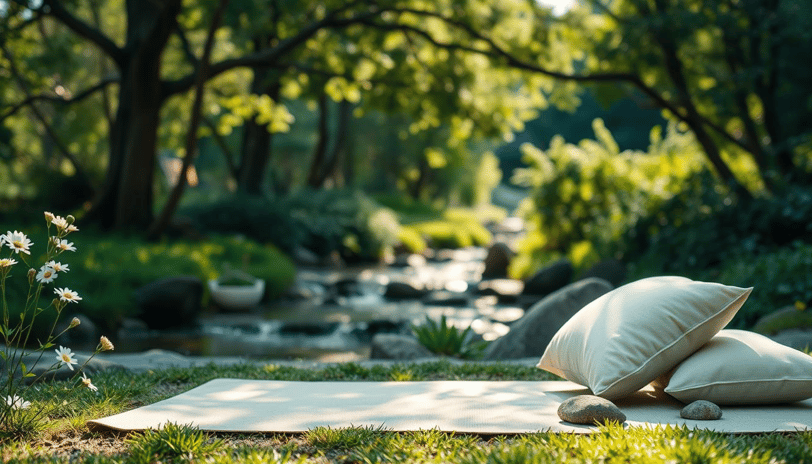Managing Stress and Anxiety in Midlife: Practical Tips
Feeling overwhelmed by stress and anxiety in your 40s and beyond? This blog post offers practical, research-backed tips to help women over 40 effectively manage stress and anxiety during the midlife years. Discover science-based strategies to reduce burnout, improve mental wellbeing, and reclaim your sense of calm. Whether you're navigating work, family, or life transitions, these stress management techniques can help you regain control and find more peace of mind. Start taking back your mental health today with our guide to managing stress and anxiety in midlife.
40+WOMEN'S HEALTHSELF CAREWELLNESS
The Better Life Team
10/7/202411 min read
Did you know nearly 4 in 10 women feel mood changes during perimenopause, like PMS? Navigating hormonal shifts and midlife challenges can be tough. But, with the right strategies, you can manage stress and anxiety. This way, you can focus on your emotional health.


Key Takeaways
Understand the impact of stress and hormonal changes on women's physical and mental health during midlife transitions.
Develop effective stress management techniques, including self-care routines, relaxation strategies, and building resilience.
Recognize the importance of maintaining a healthy work-life balance and cultivating supportive social connections.
Incorporate exercise, mindfulness, and other wellness practices to reduce anxiety and improve overall emotional well-being.
Seek professional help when needed to address mental health concerns and navigate the unique challenges of midlife.
Understanding Stress and Its Impact on Women's Health
Stress is a natural response our bodies have to threats or demands. It can deeply affect our well-being. Women's health is uniquely impacted by stress, especially during midlife. It's key to grasp how stress affects women differently.
What is Stress and Why Does It Affect Women Differently?
Stress happens when our body sees a threat or demand. It triggers physical and emotional reactions. Women often face more stress due to hormonal changes, caring for others, and societal expectations.
The perimenopause, starting around mid 40s, during this time, women deal with over 40 symptoms from hormone changes.
As we move into the middle years of life, it's not uncommon to feel overwhelmed by increasing responsibilities and changing hormones. Many women in midlife find themselves juggling the demands of career, family, and personal care - all while navigating the physical and emotional shifts that come with this stage of life. It's no wonder that stress and anxiety can start to creep in, making it harder to enjoy this important phase.
However, there are practical steps you can take to regain a sense of balance and control. Try incorporating stress-relieving activities like meditation, yoga, or simply taking regular breaks to recharge. It's also crucial to prioritize self-care, whether that means getting enough sleep, eating nourishing foods, or setting aside time for hobbies you enjoy.
With the right coping strategies, you can ride the waves of midlife with more ease and even discover newfound joy and fulfillment. The key is being patient and compassionate with yourself as you figure out what works best.
The Consequences of Chronic Stress on Physical and Mental Well-being
Long-term stress can harm both physical and mental health. Women might gain weight, have hot flashes, and vaginal dryness. They also face emotional issues like anxiety, mood swings, and trouble focusing.
Midlife stress can lead to sleep problems, heart disease, and a weak immune system. In 2017, 25% of middle-aged women in the US had sleep issues due to hormones. Women are also more likely to have insomnia than men.
"Preparation for midlife challenges is crucial, as symptoms can affect work performance and mental health."
It's vital to understand and tackle women's unique stress experiences. This proactive approach is key to keeping physical and mental health in check during midlife.
Building Resilience: Strategies for Stress Management
Midlife can be tough, but building resilience helps manage stress. Recognizing stress signs and practicing self-care are key. These steps help you grow strong and adaptable to face life's hurdles.
Recognizing and Countering Signs of Stress
Stress shows up in physical and emotional ways. Look out for signs like fatigue, headaches, and irritability. When you see these, take a break and use stress-busting techniques.
Deep breathing, muscle relaxation, and mindfulness are great for fighting stress. They help your body and mind feel better.
The Importance of Self-Care and Taking Time for Yourself
Do things that make you feel good, like yoga or nature walks.
Make sure you sleep well, eat right, and move often.
Say no to things that make you tired or upset.
Enjoy hobbies and activities that bring you happiness.
Taking care of yourself is essential, not a luxury. It helps you build resilience and handle midlife's challenges. By focusing on self-care, you'll manage stress better and stay well.

"Resilience is not about being strong all the time. It's about being able to adapt to life's challenges and bounce back from setbacks."
Establishing Healthy Routines for Reducing Stress
Midlife can be tough, but healthy routines can help a lot. Adding stress-reducing activities to your day can make you feel more in charge. It also boosts your overall health.
First, work on managing your time better. Make a schedule that balances work, self-care, and fun. Set aside times for things like exercise, meditation, or journaling. Try different routines until you find one that fits you.
Add stress-relief activities like yoga, deep breathing, or short walks to your day.
Stick to a regular sleep schedule, aiming for 7-9 hours each night.
Prepare healthy snacks and plan meals to keep your body and mind strong.
Your daily plan should match your needs and likes. Healthy habits help you feel in control and strong against stress.
"Adding stress-relieving activities to your routine can greatly improve your well-being. It's about finding what suits you and making it a regular part of your life."
Keep trying different routines until you find one that works for stress and a healthy life. By focusing on self-care and time management, you'll face midlife's challenges with strength and clarity.
The Power of Social Connections and Support Systems
As you face midlife's challenges, a strong social support network is key. It helps manage stress and anxiety. Your relationships and connections are vital for your well-being and emotional strength.
Staying Connected with Friends and Family
Make time for your loved ones. Schedule regular meet-ups with friends or set aside family time. These moments offer emotional support and a sense of belonging, easing feelings of loneliness.
Finding New Communities and Building Meaningful Relationships
Don't just focus on keeping old relationships alive. Look for new ways to build a support system. Join local groups, volunteer, or try new hobbies. This way, you meet people who share your interests and values. These new connections can boost your emotional support and help you deal with life's ups and downs.
"Having strong social support can be a protective factor against mental health struggles. Individuals with a greater number of meaningful relationships tend to have higher levels of well-being and resilience."
Your social connections are more than just relationships. They are a source of resilience and emotional support in stressful times. Invest in these bonds to better handle midlife's demands.
Reframing Your Mindset: Seeing Stress Through a Different Lens
Midlife can be tough, but managing stress is all about your mindset. By using a cognitive-behavioral approach, you can change your thoughts. This helps you see life in a more positive light.
Challenging negative thoughts is a key strategy. When stress hits, pause and check your thoughts. Are you making things worse or seeing things unrealistically? By spotting these patterns, you can swap them for better, problem-solving thoughts.
Having a positive mindset is key to handling stress. Instead of focusing on the bad, look at what you can control and solve. Believe you can tackle challenges and grow from them.
Mindfulness and meditation can also help. They teach you to be aware and present. This way, you can let go of anxious thoughts and handle your emotions better.
"Stress is not a state of mind—it's physiological. Once you understand that, you can start to control it better." - Janice Kaplan, author of The Gratitude Diaries
Stress is a normal part of life, but it shouldn't rule you. By changing your mindset and using a cognitive-behavioral approach, you can see things differently. This helps you face midlife challenges with confidence and hope.
Stress management for women 40+
Women in their 40s face unique challenges that make stress management key. Hormonal changes, empty nest syndrome, and menopause can increase stress. It's important to find stress-relief techniques that fit their life stages and needs.
Adapting Stress-Relief Techniques for Different Life Stages
Stress strategies from the 30s may not work as well in the 40s. Hormonal shifts, family changes, and more caregiving duties require new approaches. Using adaptogenic herbs, getting quality sleep, and eating well can help manage midlife stress.
Addressing Unique Challenges of Midlife Transitions
Women in midlife deal with hormonal changes, empty nest syndrome, and caregiver burnout. These challenges can raise stress levels. Understanding these impacts helps women find coping strategies to stay well.
Hormone changes: Mood swings, anxiety, and weight gain can be managed with specific stress-relief methods.
Empty nest syndrome: Finding new purposes and connections helps cope with the loss of parenting duties.
Caregiver burnout: Self-care and support systems are crucial for those caring for aging parents or grandchildren.
Menopause coping: Mindfulness, exercise, and supplements can ease the physical and emotional changes of menopause.
By tackling midlife challenges, women 40 and older can manage stress effectively. This helps them navigate this period with resilience and hope.


The Role of Exercise and Physical Activity
Adding regular physical activity to your day can help manage stress and anxiety. Exercise boosts fitness and offers a way to release tension. It also helps restore your mental health.
Incorporating Exercise into Your Routine for Stress Relief
Activities like a brisk walk, yoga, or strength training can help you deal with midlife stress. They improve mood, sleep, and brain function. Exercise also lowers the risk of chronic diseases.
Aim for at least 150 minutes per week of moderate-intensity physical activity, such as brisk walking, swimming, or cycling, to reap the cardiovascular health benefits.
Incorporate strength training exercises, like resistance bands or bodyweight exercises, at least two days per week to maintain muscle mass and bone density.
Explore activities you genuinely enjoy, whether it's hiking, dancing, or playing a sport, to make exercise a natural part of your lifestyle.
By making physical activity a priority, you can harness its stress-relieving benefits. This supports your well-being in midlife and beyond.
"Regular physical activity can reduce the short-term feelings of anxiety in adults."
Mindfulness and Meditation Practices for Reducing Anxiety
Midlife can be stressful, but mindfulness and meditation can help. These practices calm the mind, improve emotional control, and boost well-being. They are ancient methods that still offer great benefits today.
Beginner's Guide to Mindfulness and Meditation
Mindfulness meditation is great for beginners. It's about focusing on the now, gently bringing your mind back when it strays. Breathing meditation is also simple and effective, calming the mind by focusing on breath.
Start with just 5-10 minutes of meditation per day and gradually increase the duration as you become more comfortable with the practice.
Be patient with yourself - it's common for the mind to wander, especially when you're new to meditation. Gently redirect your focus back to the present moment.
Consider trying body scan meditation, which combines mindfulness with physical awareness to release tension and cultivate a deeper mind-body connection.
Mindfulness and meditation can lower stress, anxiety, and depression. They also boost the immune system, manage pain, and improve brain health. By adding these practices to your daily routine, you can manage anxiety and find inner peace.


"Mindfulness is the basic human ability to be fully present, aware of where we are and what we're doing, and not overly reactive or overwhelmed by what's going on around us." - Jon Kabat-Zinn
Seeking Professional Help When Needed
Knowing when stress and anxiety are too much is key. If your usual ways to handle stress don't work anymore, it's time to get help. If you're feeling emotionally or physically stuck, talking to a mental health expert might be necessary.
When to Consult a Mental Health Professional
Signs you need help include feeling overwhelmed all the time. If your sleep, appetite, mood, or focus is off, it's a clue. Feeling sad, hopeless, or anxious for a long time also means you might need support.
Resources for Finding Support and Treatment Options
Looking for a mental health pro? Think about therapists, counselors, or psychologists who use CBT. Your doctor can give you names. Your insurance or local mental health groups can help find affordable help near you.
FAQ
What is stress and why does it affect women differently?
Stress is how our body reacts to tough situations. Women often feel stress in unique ways. This is due to hormonal changes, caring for others, and societal expectations. Long-term stress can harm a woman's health and mind.
What are the consequences of chronic stress on women's health?
Chronic stress can cause many health problems for women. These include anxiety, depression, headaches, and trouble sleeping. It can also weaken the immune system and increase the risk of heart disease.
How can I build resilience and manage stress effectively?
Building resilience means recognizing stress signs and taking care of yourself. You can use techniques like deep breathing and mindfulness. It's also important to make time for activities that make you feel good.
What are some healthy routines and habits that can help reduce stress?
Healthy routines include regular exercise and meditation. Time management and relaxation practices are also helpful. These can lessen stress's impact on your life.
How can social connections and support systems help manage stress?
Strong social connections and new friendships offer emotional support. They help reduce stress. Being part of your community and finding new support networks is also beneficial.
How can I reframe my mindset to better cope with stress?
A positive mindset can change how you handle stress. Try to see things more positively and solve problems. This can help you view stress in a new light.
How can women in their 40s and beyond address unique stress management needs?
Women in midlife face specific challenges like hormonal changes and menopause. Adapting stress-relief techniques to these life stages is key. It's important to address these unique concerns for effective stress management.
What role does exercise and physical activity play in managing stress?
Exercise is crucial for reducing stress and anxiety. It improves mood and sleep, boosting overall well-being. It's a valuable tool for managing stress.
How can mindfulness and meditation practices help with stress and anxiety?
Mindfulness and meditation calm the mind and reduce anxiety. They help you stay present and manage stress better. These practices are powerful for relaxation and focus.
When should I seek professional help for stress and anxiety?
If stress and anxiety overwhelm you, it's time to seek help. A mental health professional can offer support and strategies. They can help you cope with stress in a healthy way.
Source Links
Mood Changes During Perimenopause Are Real. Here’s What to Know. - https://www.acog.org/womens-health/experts-and-stories/the-latest/mood-changes-during-perimenopause-are-real-heres-what-to-know
Midlife Crisis in Women: How It Feels, What Causes It, and What to Do - https://www.healthline.com/health/midlife-crisis-women
‘I started to unravel’: Why do so many women over 40 struggle with stress? - https://www.theguardian.com/lifeandstyle/2023/jun/11/i-started-to-unravel-why-do-so-many-women-over-40-struggle-with-stress
You're Turning 40-Embracing Both Physical and Emotional Changes at this Milestone Birthday - https://www.mankatoclinic.com/blog/youre-turning-40
reasons ladies over 40 need to focus on stress management + build resiliency - Emily Field RD - https://emilyfieldrd.com/blog/reasons-ladies-over-40-need-to-focus-on-stress-management-build-resiliency/
10 Strategies to Become More Emotionally Resilient | VMA Psych - https://www.vmapsych.com/resources/10-strategies-to-become-more-emotionally-resilient
Start These Habits Now to Keep Your Mind and Body Healthy for Life - https://www.womenshealthmag.com/health/g29109557/health-habits-40/
10 healthy habits to put in place by age 40 - https://wexnermedical.osu.edu/blog/10-healthy-habits-to-put-in-place-by-age-40
How to be your best self in your 40s - https://www.bswhealth.com/blog/women-health-forties
The Cumulative Influence of Perceived Discrimination, Stress, and Coping Responses on Symptoms of Depression Among Young African American Mothers - https://www.ncbi.nlm.nih.gov/pmc/articles/PMC9839894/
Meaningful Relationships in Community and Clinical Samples: Their Importance for Mental Health - https://www.ncbi.nlm.nih.gov/pmc/articles/PMC9133738/
How to rewire your brain and body for more resilience with Dr. Aditi Nerukar - https://40plusfitnesspodcast.com/how-to-rewire-your-brain-and-body-for-more-resilience-with-dr-aditi-nerukar/
Transformation and Growth: They’re Not Gonna Happen in Your Comfort Zones, Baby! Part I - Role Models - https://www.linkedin.com/pulse/transformation-growth-theyre-gonna-happen-your-zones-natanya
Addressing the Midlife Happiness ‘Dip’: An Evidence-informed, Mindfulness-based Approach to Support & Promote Women’s Well-being - https://digitalcommons.lesley.edu/cgi/viewcontent.cgi?article=1038&context=mindfulness_theses
Stress Management - https://themidst.co.uk/pages/stress-management?srsltid=AfmBOopqF-_2mzsCzeUNKFFhVMcX3kitP5oXPt-V-HCaRUuS5Wereeoo
What every woman over 40 needs to know about CORTISOL before attempting to lose weight - https://www.hormonerebalance.com/what-every-woman-over-40-needs-to-know-about-cortisol-to-lose-weight/
40 Essential Healthy Habits for Women Over 40 - https://hola.health/health-info/diet-lifestyle/40-essential-healthy-habits-for-women-over-40/
Benefits of Physical Activity - https://www.cdc.gov/physical-activity-basics/benefits/index.html
Workout Tips for Women Over 40 - https://www.healthline.com/health/workout-tips-for-women-over-forty
Exercise and Hormones for Women Over 40 - https://integrativewomenshealthinstitute.com/exercise-and-hormones-for-women-over-40/
Meditation for Reducing Stress: Beginner Tips - https://medium.com/@francesco.saviano87/meditation-for-reducing-stress-beginner-tips-fdd9b322cf3b
5 Meditations to Support Mental Health Awareness Month - https://www.mindful.org/5-meditations-to-support-mental-health-awareness-month/
Healthy Coping Mindfulness Techniques to Manage Stress - https://www.idanim.com/blog/stress-management-techniques
What are the best ways to seek help when you're feeling overwhelmed? - https://www.linkedin.com/advice/0/what-best-ways-seek-help-when-youre-feeling-overwhelmed-3zkjc
Strategies for Managing Stress at Work — Thrive Psychology Group - https://www.mythrivepsychology.com/thrive-blog/managing-stress-at-work
Symptoms of Stress in Women: Emotional, Cognitive, Physical - https://www.healthline.com/health/stress/symptoms-of-stress-in-women